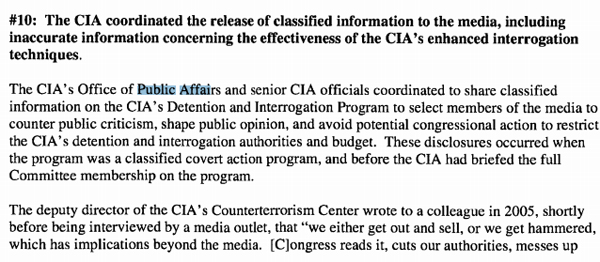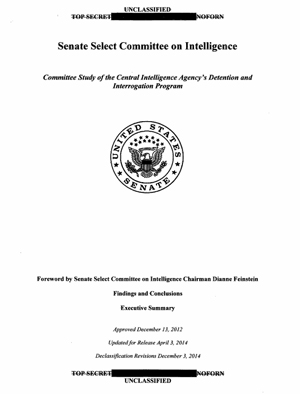The CIA's Office of Public Affairs leaked false information to boost the agency's profile and protect its controversial detention and interrogation program, according to a summary of the blockbuster Senate Intelligence Committee report released Dec. 9. Among campaigns to burnish its image and the detention program, the CIA also engaged in a PR campaign to connect the detention program to the killing of Osama bin Laden.
"Much of the information the CIA provided to the media on the operation of the CIA's detention and interrogation program and the effectiveness of its enhanced interrogation techniques was inaccurate and was similar to the inaccurate information provided by the CIA to the Congress, the Department of Justice, and the White House," the report concludes.
Senate investigators found that CIA PA staff and senior officials coordinated to share classified information on the detention program to select members of the press to "counter public criticism, shape public opinion and void potential congressional action to restrict the CIA's detention and interrogation authorities and budget."

The deputy director of the CIA's Counterterrorism Center, Philip Mudd, wrote to a colleague before a media interview that "we either get out and sell, or we get hammered, which has implications beyond the media … we either put out the story or we get eaten. [T]here is no middle ground." The same official explained that when the Washington Post or New York Times quoted a "senior intelligence official," it was "us … authorized and directed by [CIA's Office of PA]."
In late 2004, the CIA proposed a PR campaign to include disclosures about the "effectiveness" of the detention program as the National Security Council considered "endgame" options for the program, the report found. CIA talking points noted that "[i]f done cleverly, selected disclosure of intelligence results could heighten the anxiety of terrorists at large about the sophistication of [US government] methods and underscore the seriousness of American commitment to prosecute aggressively the War on Terrorism."
In one example of how the campaign played out, the report cites a June 24, 2005 "Dateline NBC" report accompanied by several online articles quoting named and unnamed intelligence officials claimed the capture of Ramzi bin al-Shibh led to the captures of Khalid Sheikh Mohamman and Khallad bin Attash. The Senate report said that information was inaccurate.
When the Bush administration decided to seek legislative backing for the program, it chose to do so by publicly disclosing the program's existence in a 2006 by President Bush. The Senate report detailed the CIA's process of vetting and crafting that speech, which included claims that were unsupported by CIA records or cables. After the president delivered the speech in September 2006, press accounts challenged some of the claims, including pieces by the New York Times and Time magazine.
The Senate report said of Bush's speech: "The inaccurate representations in the speech have been repeated in numerous articles, books, and broadcasts."
The Bin Laden Campaign
In a PR offensive planned well before the raid that killed bin Laden, the CIA sought to publicly attribute the successful mission to kill the terror kingpin to information gleaned from the detainee program.
 A CIA report, under the heading "The Public Roll-Out," said the Office of PA was formally brought into the bin Laden operation in late March 2011, two months before bin Laden was killed.
A CIA report, under the heading "The Public Roll-Out," said the Office of PA was formally brought into the bin Laden operation in late March 2011, two months before bin Laden was killed.
"The vast majority of the documents, statements, and testimony highlighting information obtained from the use of the CIA's enhanced interrogation techniques, or from CIA detainees more generally was inaccurate and incongruent with CIA records," the Senate report concludes, noting CIA officials tried to make the connection "within days of the raid" on bin Laden's compound.
In a statement released Dec. 9, the CIA said information the CIA obtained from detainees "played a role, in combination with other streams of intelligence, in finding" bin Laden.
The agency pointed to its 2013 response report that acknowledges "shortcomings" and "mistakes" in the program, which was ended by President Barack Obama in 2009. It disagrees with the Senate report's claims that it misled Congress, the administration and the public.
Said the CIA: "The Agency’s record is not perfect – there were instances where representations about the program that were used or approved by Agency officers were inaccurate, imprecise, or fell short of Agency tradecraft standards -- but the factual record does not support the inference in the Study that the Agency conspired to intentionally mislead the Congress or others regarding the effectiveness of the program."


 Husch Blackwell Strategies has added FleishmanHillard alum Michael Slatin as a principal in its public affairs group.
Husch Blackwell Strategies has added FleishmanHillard alum Michael Slatin as a principal in its public affairs group. Rory Cooper, a veteran Republican operative and policy specialist, has joined Teneo’s Washington office as senior managing director in its strategy & communications practice.
Rory Cooper, a veteran Republican operative and policy specialist, has joined Teneo’s Washington office as senior managing director in its strategy & communications practice. Brian Fallon, who served as national press secretary for Hillary Clinton’s 2016 presidential run, is signing on next month as Vice President’s Kamala Harris’ campaign communications director.
Brian Fallon, who served as national press secretary for Hillary Clinton’s 2016 presidential run, is signing on next month as Vice President’s Kamala Harris’ campaign communications director. TikTok is nothing more than a Chinese propaganda tool that poses “a grave threat to America’s national security and, in particular, impressionable children and young adults,” say two Congressmen who want the platform registered as a foreign agent.
TikTok is nothing more than a Chinese propaganda tool that poses “a grave threat to America’s national security and, in particular, impressionable children and young adults,” say two Congressmen who want the platform registered as a foreign agent. Public Strategies Washington has added Abbie Sorrendino, a former aide to now Senate Majority Leader Chuck Schumer.
Public Strategies Washington has added Abbie Sorrendino, a former aide to now Senate Majority Leader Chuck Schumer.


 Have a comment? Send it to
Have a comment? Send it to 
No comments have been submitted for this story yet.